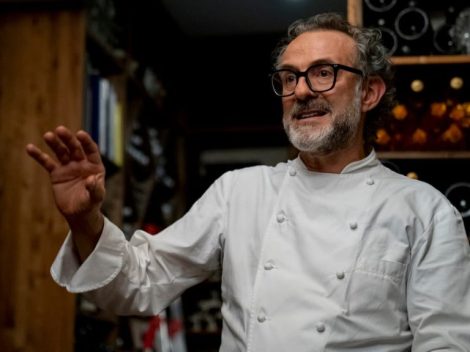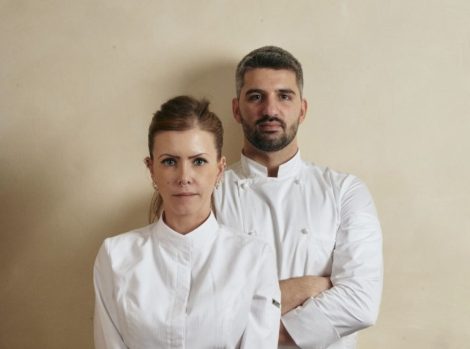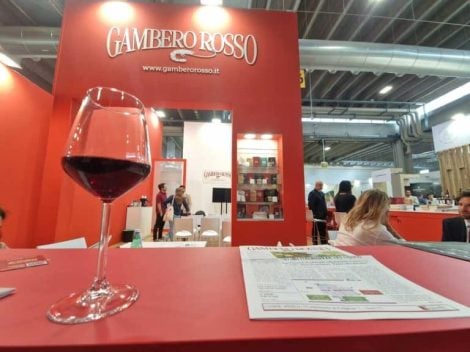Young, talented, and very busy. These are the latest generation of chefs, the new faces of the culinary world. Social, contemporary, and well-travelled. “There are young people,” says Luigi Cremona, journalist and food critic, “who by the age of 25 have already travelled half the world.” They've seized the spotlight, hastening the generational shift with a touch of force that, in many sectors of business in Italy, struggles to advance. But in the kitchen, it seems faster and more effective, especially since the culinary world moves quickly and is consumed rapidly.
Portrait of a young chef
The portrait of a young Italian chef inevitably starts with the differences from the great masters, who are somewhat rare in Italy. The context they begin in is also different. “The young people starting today,” says Enrico Bartolini, who holds three Michelin stars at his restaurant in Mudec, Milan, and is a talent scout, with many of his chefs working in his ten restaurants, boasting a total of thirteen Michelin stars in Italy alone, “are facing an evolved market, with clients who know gourmet cuisine. We’ve seen so much, almost everything.” The environment is different, the technology is different: “Young chefs now have it easier, they work in kitchens with air conditioning and induction hobs. We worked in three-hundred-degree hell,” recalls Gaetano Trovato, chef at Arnolfo in Colle Val d’Elsa and mentor to dozens of young chefs. “When I was young at Trigabolo in Argenta, in the middle of nowhere,” recalls Igles Corelli, another inspiration, “everything we did then came from our own creativity. Now, if you ask me what spaghetti allo scoglio is, I can go online and find twenty recipes: everything is more immediate.” Social media plays a role, of course. “Young chefs are perhaps a little too focused on presentation, on the visual impact of a dish; they’re a bit like influencers of themselves,” says Cremona, adding, “Of course, I’m from a different generation, so I struggle to understand certain things.”

Better times today
There are many advantages, but also higher standards. “I believe,” continues Cremona, “that, generally speaking, the overall level has undoubtedly risen: chefs are much better than before. This is due to many factors, starting with schools. In the past, culinary schools were terrifying, with teachers who had no passion. Now they’ve improved a lot.” And the tools have also improved, according to Corelli: “In the past, there was just the pan, fire, and wood. Now there’s induction cooking, ultrasounds, the Pacojet. So even the taste of cooking has changed compared to those years. Cooking liver on a blackened pan or over a charcoal grill is completely different from cooking on induction.” And what about the products? “It’s not true that things were better before; in fact, I think it’s much better now because it's easier to find quality products, and it's much better to deal with an educated farmer than one who isn't.”
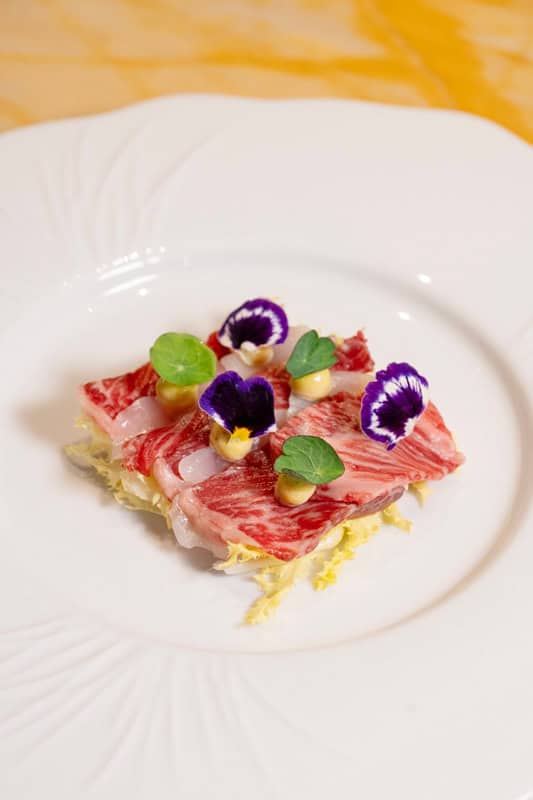
A dish by Emin Haziri, one of the under-30 talents at Procaccini in Milan.
Training: travel & terroir
And young chefs travel a lot. The result is that “today’s cuisine includes Nordic, Japanese, and Spanish influences,” says Trovato. Nothing wrong with that, as long as the connection to their own territory is maintained: “Except for the most talented young chefs, others should focus on deepening their knowledge of their own region and biodiversity; it’s the most concrete path,” advises Bartolini. The same sentiment is echoed by Paolo Lopriore, who has been “self-exiled” for years at Portico in Appiano Gentile, near Como, though he expresses it much more forcefully: “For me, globalisation in cuisine has failed, we can say that now. We have a territory, a microclimate that must be respected. We need to step away from Relais & Châteaux, step away from social media, and find the authenticity of our own place. The beauty of Italy is its incredible biodiversity from North to South. It’s absurd to eat Varvara lamb everywhere; if you serve it in Como, the client will say it’s too fatty. You either pursue gourmet cuisine, which we know is not rooted in the territory, or you pursue local cuisine, and then you must understand that the lamb here is leaner than in Puglia. Otherwise, you end up misrepresenting a territory that isn’t truly reflected on the plate.”
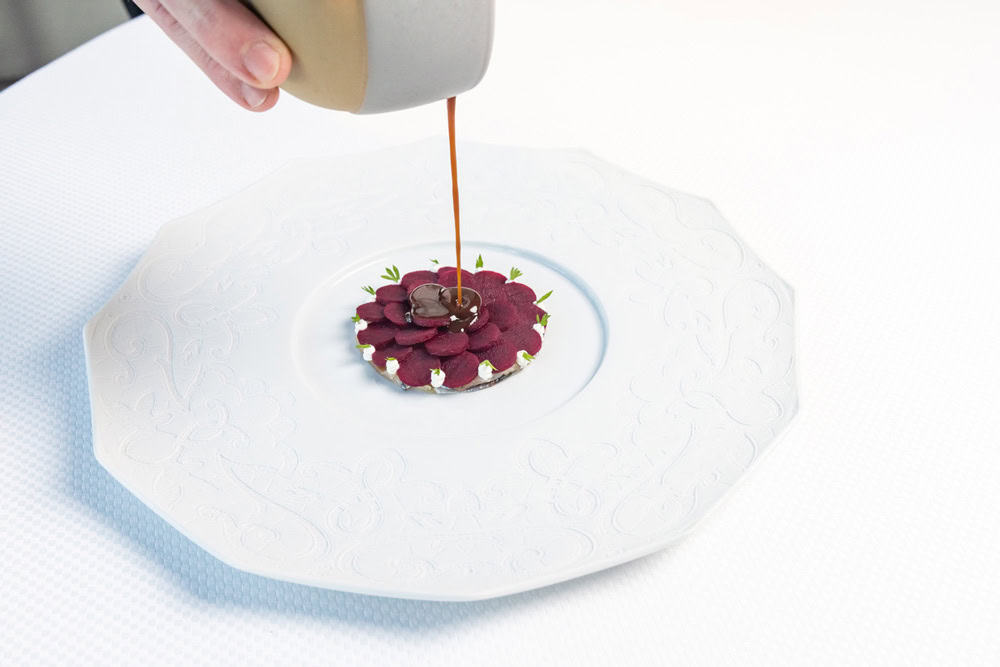
Mackerel, beetroot, yogurt, caviar, and chicken reduction by Emin Haziri.
Different lifestyles (and workstyles)
There’s often talk that young chefs today don’t want to work, but according to older colleagues, that’s not true. “No, they’re tireless, they travel, study, and communicate,” explains Lopriore. “And,” Corelli adds, “just because we worked 18-hour days doesn’t mean that was right. We lived at night, got drunk, it was the only way we could have fun. Today, there must be a completely different organisation, but let’s not forget that good food still requires many hands and a lot of time.” “Now we close for three days from January to April and for two days the rest of the year,” says Trovato. “It’s a way to stimulate and reward the younger chefs.” Emin Haziri, who is truly young at 29 and heads Procaccini in Milan, feels fortunate: “We have everything; we have technology, knowledge, many things that weren’t available before. To do well, you just need the right mindset. And how you organise the work is important. Thankfully, today’s kitchens are no longer about shouting and pushing. I’ve experienced that, and it used to be considered normal. But now, if you say something a young chef doesn’t like, you risk being reported.”
Generational pros and cons
A little presumption perhaps, but that’s better than the faults of previous generations. “In the past,” Corelli says with a smile, “chefs would lock themselves in the cold room when they wanted to season meat, so no one could learn their secrets. Many took their knowledge, stories, and recipes to the grave.” Something impossible today, when social media dominates, and sharing thoughts and actions is essential for success. “Young chefs today are very supportive of one another, they’re all friends, they help each other,” observes Cremona. “In the ‘80s and ‘90s, chefs would say, ‘Don’t go to that guy, the food’s terrible,’ even if they’d never actually been there. Even the great masters who created the golden age of Italian cuisine, and to whom we still owe so much, had this fault. Gualtiero Marchesi himself wouldn’t dine at other restaurants, and if he did, he’d order mozzarella. But today’s mindset is different, partly because many chefs now have degrees, and a solid education always helps in any human endeavour.”
The loss of talent
And a bit of luck also plays a role. “Sure, you need talent,” Corelli warns, “but the difference lies in the opportunities you take. Do you know how many talented chefs in Italy go unrecognised? My luck was meeting Giacinto Rossetti, the owner of Trigabolo, in the ‘80s. He believed in me and invested everything in that restaurant, but how many would do that today? Now, you meet local businesspeople with money who want to open a trendy spot for their friends, but they end up ruining the young chefs fresh out of school. They keep them for six or seven months, then when they realise they’re not making money, they shut down, and these young chefs are left adrift, scarred by the experience. We lose so much talent that way.” Haziri also believes in a bit of good fortune: “I was lucky to work with great chefs, especially great people, starting with Antonino Cannavacciuolo, who taught me how to run a kitchen and how to organise the work. And above all, he taught me the importance of simplicity. With simplicity, you always win, he used to tell me.”
Advice from the "masters" for the young
What advice do the masters have for young chefs? Each has their own. For Bartolini, the younger chefs should “prove themselves through seriousness and consistency, but above all, they should let their own palate shine after listening to customers, who are the first to show interest. And I encourage them to always be consistent.” Corelli’s advice: “Choose the right investor. Before signing a contract, chefs should ask a few key questions to understand the restaurateur’s goals and whether this is the right opportunity. And avoid working with chefs who throw plates; you’ll never learn anything from them.” Cremona agrees, advising caution with family-run businesses: “In Italy, we have a problem with individualism; we love family control and small enterprises, but this isn’t always an advantage.” Lopriore stresses: “Young chefs must contextualise Italian cuisine more: not just as a product but as a culture. They shouldn’t follow public demand because the public is influenced by social media. Young chefs must revitalise Italian cuisine by giving it its own value system. We are from the land of Marchesi, who revolutionised Italian cuisine by reinventing lasagne and opening up a raviolo. Lasagne and ravioli. We’ve never had gastronomic quality, but we’ve had everyday quality.” Trovato’s advice: “Young chefs should seek balance; that’s what leads to success. And of course, h<umility. Lastly, they must dare and believe in themselves.”
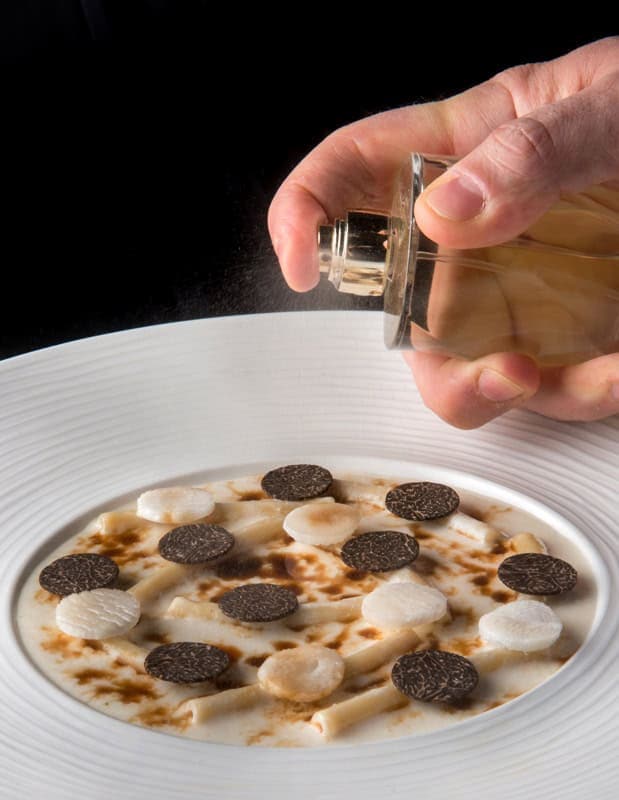
Juan Camilo Quintero, another young talent and chef at Poggio Rosso in Borgo San Felice: Maccheroncini, delicate garlic, white asparagus, and black truffle.
The most promising young chefs according to the masters
Who are some promising young chefs? “Damiano Donati at Fattoria Sardi in Lucca, who chose to work on a farm, even if sometimes he makes bread that’s a bit too difficult,” suggests Lopriore. “In Alvito, in Val di Comino,” Corelli thinks, “there’s a talented young chef named Alessio De Michelis, who was one of my students at Gambero Rosso Academy. He has a great hand and strong compositional skills, though he hasn’t yet found the balance.” “Among the young chefs, I like Alessandro Cozzolino at Villa San Michele, part of the Belmond,” says Trovato. Cremona could name many, especially those who have passed through his Emerging Chef competition (also for pastry chefs, pizza makers, and wait staff) which he has organised with his wife Lorenza Vitali for twenty years: “Oliver Piras, Mattia Pecis, who is fantastic, Michele Spadaro, Domenico Candiano from Locanda Don Serafino, Juan Camilo Quintero, Stefano Terigi from Il Giglio, and Ciro Scamardella.” And Haziri, of course, who describes himself as “ambitious in my goals, but not arrogant. We chefs don’t save lives.” True, but they can certainly make them better.

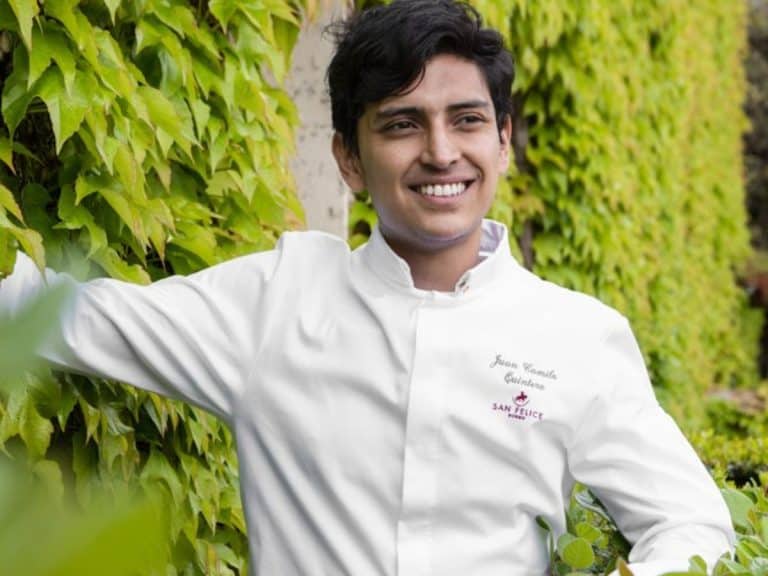
 US tariffs: here are the Italian wines most at risk, from Pinot Grigio to Chianti Classico
US tariffs: here are the Italian wines most at risk, from Pinot Grigio to Chianti Classico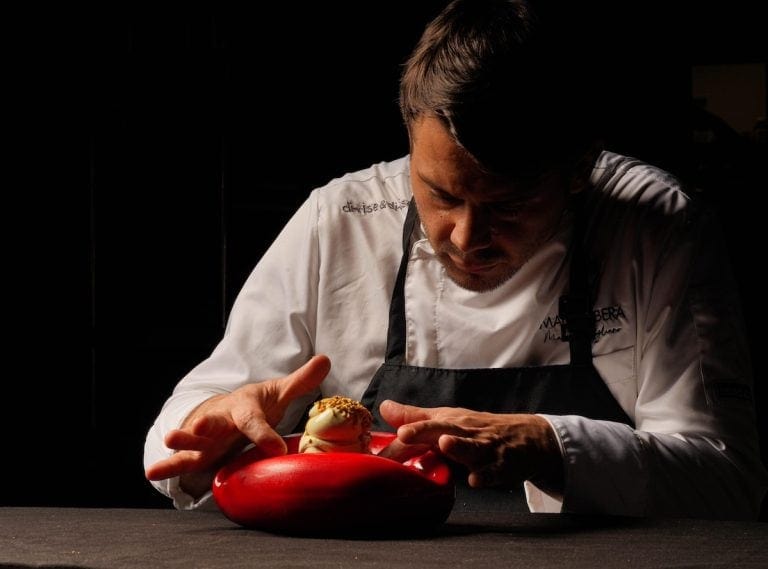 "With U.S. tariffs, buffalo mozzarella will cost almost double. We're ruined." The outburst of an Italian chef in Miami
"With U.S. tariffs, buffalo mozzarella will cost almost double. We're ruined." The outburst of an Italian chef in Miami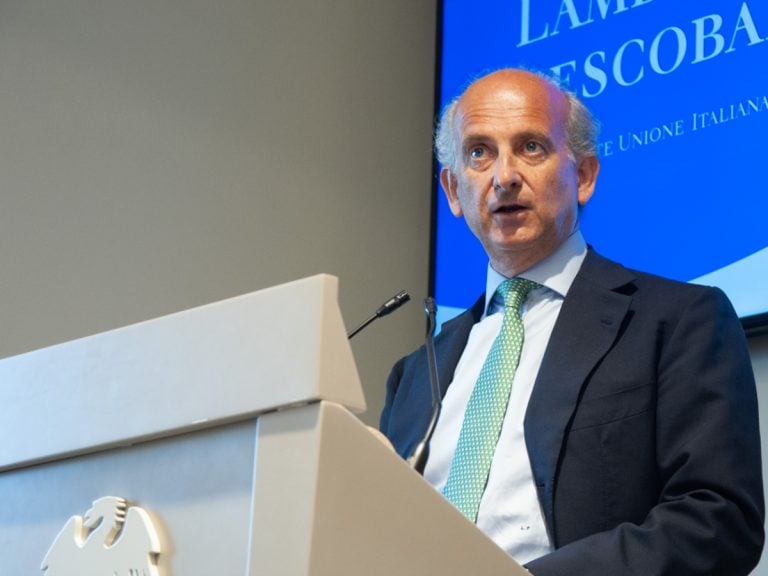 "With US tariffs, extremely high risk for Italian wine: strike deals with buyers immediately to absorb extra costs." UIV’s proposal
"With US tariffs, extremely high risk for Italian wine: strike deals with buyers immediately to absorb extra costs." UIV’s proposal Meloni: "Tariffs? If necessary, there will be consequences. Heavy impact on agri-food sector"
Meloni: "Tariffs? If necessary, there will be consequences. Heavy impact on agri-food sector" The Government honours the greats of Italian cuisine, from Bottura to Pepe. Massari: "Thank you, Meloni, the only one who listened to us"
The Government honours the greats of Italian cuisine, from Bottura to Pepe. Massari: "Thank you, Meloni, the only one who listened to us"
